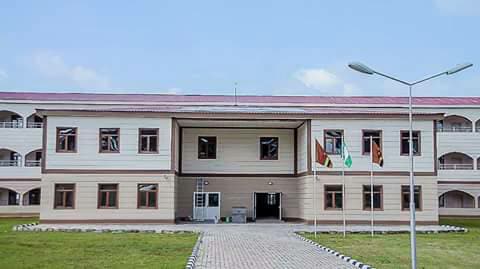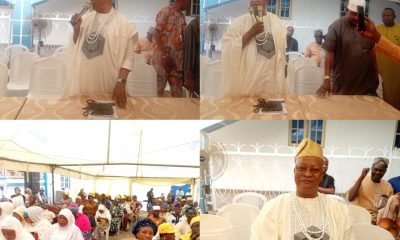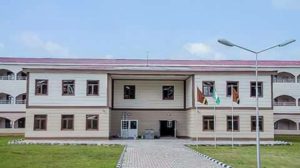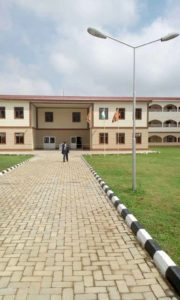News
Osun Education: A Revolution Ongoing

By Kunle Owolabi
If education is expensive, try ignorance is a popular saying and the motto of Nigerian Union of Teachers (NUT). This tacit statement undoubtedly underscores the important of knowledge (education), the acquisition of which is now compulsory for every child.
Apart from the three basic economic needs of food, clothing and shelter, education is the next compulsory aspect of life needed by every individual. It is through education that the world has advanced to the present technological stage. As it has been proven, therefore, no human being, group, state or nation can seek advancement without education – qualitative education to be specific.
The significance of this process of becoming civilised and knowledgeable is a central vision in the state of Osun. The Governor, Ogbeni Rauf Aregbesola had education on the top of his agenda before coming to power, and this was expressed in his Six Integral Action Plan called ‘My Pact With the Peoples of Osun’. In the last seven years, there has been manifestation of ‘promotion of functional education’ in the state.
The revolution in education, it was gathered, started with education summit when Aregbesola discovered the sorry state of education in 2010. The summit, chaired by the Nobel Laureate, Professor Wole Soyinka, submitted far-reaching recommendations that could re-engineer and turn the education sector around 360 degree. Aregbesola’s administration followed and implemented the Soyinka Education Summit both in letter and spirit.
The education, it was learnt, began with school feeding programme called O’ Meal (which has tremendously increased the enrolment of pupils in the public schools), followed by the school re-classification, provision of digital text books to the public secondary schools tagged tablet of knowledge (Opon Imo); payment of external examination fees for all public senior secondary schools; renovation of some school building and building of modern schools across the state.
Finding by this correspondent revealed that the Aregbesola’s government has embarked on the construction of state-of-the-art 100 Elementary Schools, 50 Middle Schools and 20 High Schools. It was learnt that 20 Elementary Schools, 22 Middle Schools and 5 High Schools have been completed.
It was gathered that the 5th High School, Ilesha Government High School was commissioned on Tuesday October 24, 2017. The ceremonious commissioning of the school was very huge and magnified – as the school edifice being commissioned.
Four high schools had been previously commissioned, starting with Wole Soyinka Government High School, in Ejigbo; Osogbo Government High School, Osogbo (formally Osogbo Grammar School) which was commissioned by President Muhammadu Buhari last year; Adventist Government High School Ede (formerly Seventh Day Adventist Grammar School) and Ataoja Government High School, Osogbo (formerly Ataoja School of Science).
The Ilesa Government High School, like any other completed high school in the state, is a state-of-the-art. Many people when they see the picture, because it is so good, argue it is computer generated graphics in 3D. Actually, the high school has 3,000 capacity three-in-one school. Each school has its principal with an overall senior principal.
The complex has 72 Classrooms of 49 square-meters each capable of sitting 49 students, 6 offices for study groups, 6 laboratories, 18 toilets for young ladies, 18 toilets for young men, 1 Science library, 1 Art Library, 1 Facility manager’s office, 1 Bookshop, 1 Sick Bay, 1 Bursar’s office, 3 Principals’ offices, 3 General Staff office, 1 Senior principal’s office, 1 Record store and 1 Security shed/Reception.
There is a total of 1000 square-meters of floor space Hall capable of sitting 1000 students for external examinations. This hall has storage for equipments, utility storage, a stage, office space, storage for documents, 4 female toilets and 4 male toilets.
For sporting activities, there is an Olympic sized football field, 7-lane sprinting tracks for 100 meters and 400 meters events, a pavilion and an outdoor Basketball court that doubles as tennis court.
The school has its own borehole, an electricity transformer and an ample parking space for at least 75 cars. The school cost N1.3 billion which includes the cost of furnishing, landscape and electronic boards.
The commissioning of the school attracted people from far and near, including the General Overseer of the Redeemed Christian Church of God (RCCG), Pastor Enoch Adeboye, who was ably represented, some First Class traditional rulers including the Ooni of Ife, Oba Adeyeye Eniitan Ogunwusi and the Owa Obokun of Ijesaland, Oba Adekunle Aromolara.
In addition to the school commissioning, government also unveiled a smart identity card initiative popularly known as “Kaadi Omoluabi”, which is intended to move government closer to the people. The card, as explained, will capture all the people in the state and the data will be used in planning and policies.
Traditional rulers showered encomiums on Rauf Aregbesola’s education strides at the inauguration of the mega school in Ilesa.
Oba Ogunwusi and Oba Aromolaran in their separate remarks, lauded the state government on its investment on education and showered royal blessing on Aregbesola. Ooni who was visibly impressed by the size of hall, the classrooms and other modern facilities noted that the Governor would be remembered for good.
Ooni counseled politicians to strive to do what will make people remember them for good, saying, “Just like former governor Lateef Jakande of Lagos State is being remembered in all spheres of life today, Osun people will reference Aregbesola in years to come.”
In his speech, Aregbesola said he was fulfilled that the state could now boast of public schools that can compete with the best in the world, saying that the new schools are the ones to beat in the country today.
According to the Governor, the new schools being built was in fulfillment of his administration’s promise to provide functional basic education to the children in the state, which sprang from government’s conviction that every child is owed basic education.
He said education is a fundamental and inalienable right of every child and his government has gone to this length and committed such huge amount on education so as to prepare the children for the future.
Aregbesola said: “A good basic education fulfils the definition of literacy as the ability to read and write and is a solid foundation on which other superstructure of vocational training or higher education can be built. Having the ability to read means that one can receive information and systematized knowledge stored in various retrieval forms like books, digital electronic devices and by direct observation of events and phenomena.
“This includes the capacity to observe, understand and make sense out of nature, creation and one’s environment in the most basic form. To write means also that one can graphically reproduce one’s thought, observations, ideas and received knowledge in clear, free flowing prose, in at least one language.
“We are therefore developing the new literate man, a man not just for himself but for the collective, who sees his own existence and value in light of other members of the society. We have seen the future.
“Before our very eyes, advances in science and technology are changing our world and in the foreseeable future, we will see that those who are not well educated will be onlookers and will have no place in it. Generally, the world is increasingly being defined and controlled by those who can think and bear their intellect on matter and any situation. The possibilities therefore look infinite for them.”
Earlier in his welcome address, the Commissioner for Education, Mr. Wasiu Kolawole Omotunde-Young, described the commissioning of high school as another milestone in the efforts of the government to lay solid and enduring foundation for ‘Functional Education’ in the State.
He said government was proud to commission the newly built world class school, comparable to any of its peers from the best parts of the world.
“Promoting functional education is one of the Six–Point Integral Action plans of Aregbesola’s pact with the people of the state of Osun. Government inherited an appalling education system, which led to the conveyance of a state Education Summit in February 2011, which provided the Blueprint for repositioning the education sector in Osun.
“This school is the second of its specific types built with most modern prefabricated steel and cladding – after Osogbo Government High School – and the fifth of the world class schools to be commissioned in the Aregbesola’s administration.
“The world class schools with modern facilities that now adorn the State of Osun are the result of a well-planned, highly focused and carefully articulated policy, which targets Public School Infrastructural Renewal as one of the fundamental requirements to transform our educational system .
“For instance, Osun in 2017 records 45.59% in performance in WAEC even though this is not good enough. Yet it shows 290% growth from the best of the years before Aregbesola’s government and a pointer to a better future. This could be better achieved with people’s support for Aregbesola and those who share his vision of a society run with Omoluabi values,” Omotunde-Young said.
Explaining the rationale behind the introduction of the ‘Kaadi Omoluabi’, the Commissioner for Commerce, Cooperative, Investment and Empowerment, Mr Ismail Jayeoba Alagbada disclosed that the residency smart card initiative was an initiative that will further move government closer to the people.
According to Alagbada, the introduction and distribution of “Omoluabi Card” would go a long way to assist the government in the collation of data of the residents for appropriate allocation of resources and implementation of pro-masses policies.
He added that the Omoluabi Card will serve as a remarkable socio-economic drive as it will in no doubt provide government accurate information on the population of the people residing in the state as well as their needs.
Alagbada said about 230, 322 from public elementary schools have been captured in the first phase which was completed in 2014 and the registration of students in middle and high school have commenced, adding that more than 409, 664 adults had been enrolled, while their validation was in progress.
He said: “This card will help to determine the population strength, population density within and outside a demographic composition with the aim of providing the required needs of the populace.
“I have confidence in the fact that the card initiative would further add values to the economy of the state as the socio-economic landscape of the state will be greatly impacted.
“With this development ongoing, many watchers of the happenings in the education sector in Osun are will not disagree that the future of children in the state is assured.”
-

 News5 days ago
News5 days agoInsecurity: Kogi Schools Resume On Monday
-

 Opinion4 days ago
Opinion4 days agoDon’t Pull the Plug: Why Nigerians Are Pleading for the U.S. to Extend Its Police Training Program — and Why It Must Synergize With New Military Arrivals
-

 Crime4 days ago
Crime4 days agoVigilante Reportedly Shoots Colleague Dead In Plateau
-

 News2 days ago
News2 days agoRamadan: Osun Cleric Urges Compassion Among Muslims As Asejere Distributes Relief Materials To 537 Beneficiaries




1 Comment